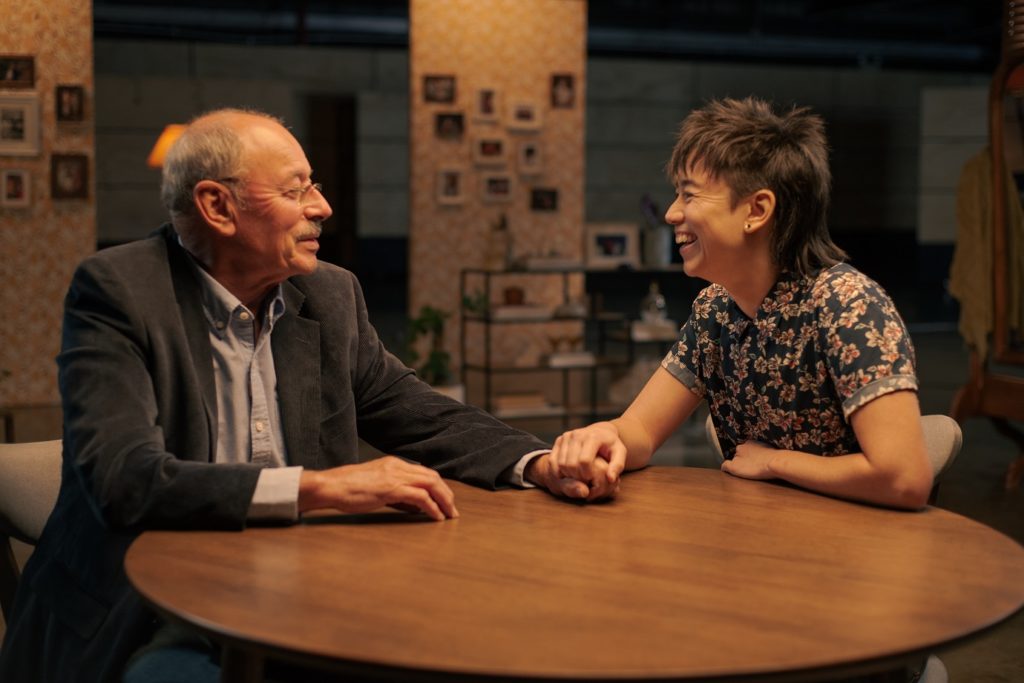When Zay came out to their parents, telling them about how they identified as gender fluid, they received support from the outset. There were lots of questions, but on top of any immediate confusion was a willingness to listen and understand.
“I came out as gender fluid to my parents not that long ago. And it was the second time that I came out, because I had originally come out as a lesbian,” Zay said.
“I sat them down and I said, ‘hey mum, hey dad I want to talk to you about something that’s really, really important to me’ and I told them how I identified. And they listened.”
Zay’s father Bill said it gave the family a springboard to understand and get to know Zay more deeply.
“I feel so privileged to be in a family where I know that I’m not going to get kicked out for my identity. I’m not going to be disowned. That is a privilege that not everyone has,” Zay said.
Indeed, many people in the LGBTQ+ community do not experience such understanding from their families, with recent research from Latrobe University showing that 6 in 10 LGBTIQ+ people have experienced family violence. Most commonly, it is parents and siblings who are the perpetrators.
Respect Victoria’s latest campaign, launched last week, is aiming to change the conversation around family violence, by showcasing the importance of family support in preventing all forms of family violence.
LGBTIQ+ people can face specific forms of family violence that are unique to their sexuality or gender identity. This can take the form of rejection from family, purposely misgendering or deadnaming a person, refusing to access gender-affirming medication, as well as faith or religious-motivated abuse.
“From schools, to workplaces, to families, to the halls of Parliament, we have seen people in Australia stand up and call for an end to family violence and violence against women this year,” CEO of Respect Victoria Tracey Gaudry told Women’s Agenda.
“We must also ensure that our approach to family violence is intersectional and inclusive of communities who may not fit the examples we often see in the media.”
Gaudry said Respect Victoria wants to spark conversation about family violence experienced by LGBTIQ+ people, with a particular focus on abuse perpetrated by family members.
“It also acts as a reminder that violence doesn’t only occur in heterosexual relationships, and that the drivers of violence can be different for LGBTIQ+ people – including homophobia, biphobia and transphobia.”
CEO of Switchboard Victoria Joe Ball says language always matters, and we should never expect LGBTIQ+ survivors of family violence to read between the lines of mainstream family violence campaigns.
“If you are not reflected in a campaign, through language and imagery, then your first and usually only response is that this is not for me, they are not talking to me,” Ball said. “The use of the language ‘men’s violence against women’ is only part of the story and the reality is that the rates of family violence within LGBTIQA+ communities are higher than heterosexuals.”
“Of course for some people in our LGBTIQA+ communities, for some bisexual women, intersex women or trans women, the violence is sometimes men’s violence against women, but even in these LGBTIQA+ relationships the experiences of violence can be different as the power and control often weaponises biphobia, intersexism and transphobia, as much as misogyny.”
Ultimately, Gaudry hopes that this campaign encourages families to consider how they talk about sexuality and gender identity at home, particularly parents and sibilings of LGBTIQ+ people.
“Knowledge is power, and by learning more about sexuality and gender identities, families can ultimately prevent family violence,” she said.
“This campaign encourages all families to lead with respect and ask LGBTIQ+ family members what they need to feel safe and heard – because support from parents and siblings can make a world of difference.”
LGBTIQ+ people and their families can contact Rainbow Door for free advice and support. Rainbow Door is open 10am – 5pm, everyday and can be accessed via phonecall, text or email. Call 1800 729 367, SMS 0480 017 246, email: [email protected] or visit the Rainbow Door website.
You can also call 1800RESPECT on 1800 737 732 or visit 1800RESPECT.org.au.
In an emergency, call 000.


